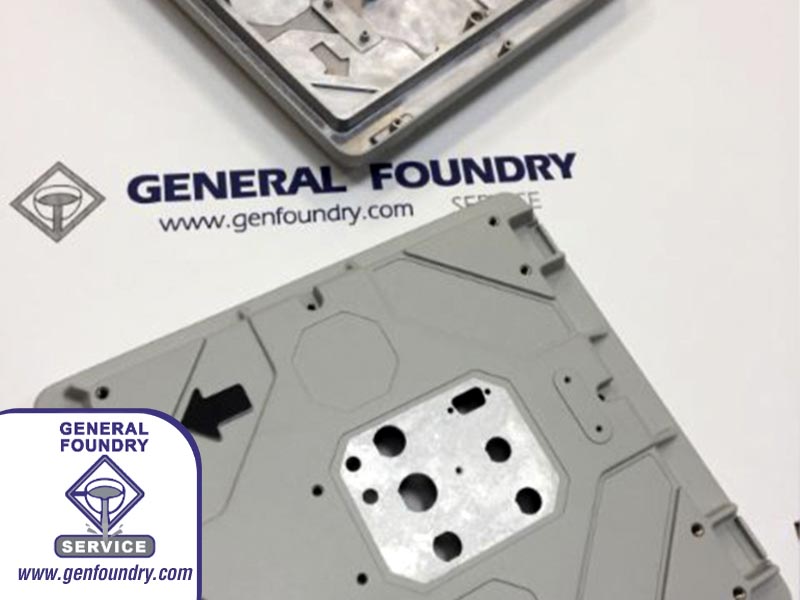
Rubber Plaster Mold casting (RPM) is a metal casting process that utilizes a flexible rubber tool and a plaster material mold to produce intricate, highly detailed aluminum or zinc aluminum castings. The plaster mold is created from a rubber pattern or master model and a plaster material is poured against the rubber pattern halves to create two plaster mold halves, which is cured and then removed from the pattern. Castings made from this process are often used in applications that are similar to die castings since the plaster mold will give you the same characteristics (smooth surface finish, thin walls, and complex geometries) as a die cast part. After the casting is removed from the mold, it is cleaned and finished to produce a final product with a high degree of detail and accuracy. RPM castings are ideal for creating intricate parts with thin walls and complex geometries. The process is excellent for both prototypes and low-volume production.
What is the Rubber Plaster Mold (RPM) casting process?
Compared to other casting processes (such as investment, sand, permanent mold, and die casting), Rubber Plaster Mold castings provide thinner walls, smoother surface finish, and crisp features. This casting process is often used for small to medium size intricate parts that would be difficult to cast using other methods.
How is a Rubber Plaster Mold created?
- The process begins with the creation of the master pattern or model (the design used to create the physical molds);
- Then the creation of the master negative molds;
- Next, the rubber positive molds are made (the pattern used to create the final plaster mold);
- Finally, the plaster mold halves and core boxes (if required) are made.
Once those steps are all completed, the finished plaster mold can be used for casting metal parts.
Why choose Rubber Plaster Mold (RPM) casting for your project?
Parts made utilizing Rubber Plaster Mold (RPM) casting will give you similar characteristics to die castings: 63 RMS surface finish, thin (down to 2mm), and complex/deep draw geometries. Additionally, parts created utilizing this process can accommodate the highest design freedom, often breaking many established die-casting design rules. Hollow features or undercuts are made with plaster cores instead of sand, and the RPM process yields noticeably crisper features than some other casting processes, such as sand castings.
Some other advantages RPM castings offer compared to other casting methods include (but are not limited to):
- They are cost-effective.
- They offer more design freedom with considerably less draft, or zero taper, required.
- Rubber Plaster Molds are relatively easy to make and require minimal tooling.
- The rubber pattern halves can be used multiple times, which helps reduce waste and cost.
- The molds provide a high degree of detail with excellent surface finish and dimensional accuracy.
- They offer tighter ‘as cast’ tolerances compared to other casting processes.
- Parts created have smooth surfaces and crisp feature definitions.
- This process is particularly suitable for castings with extremely thin sections.
- Minimal machining and other finishing operations required.
- The process can accommodate prototypes, as well as low-volume, medium, and large production runs.
What are some common industries and applications for Rubber Plaster Mold castings?
Compared to die casting, the rubber plaster mold process produces castings with lower tooling costs and faster lead times. The process is efficient for low-volumes and can provide a reliable production outlet for numerous industrial industries and applications, including (but not limited to):
- Aerospace (non-structural)
- Automotive
- Biotech
- Electronics
- Life science
- Medical and dental equipment
- Robotics
- Semiconductor
Examples of products that use the Rubber Plaster Mold process include medical components, robotic arms, hollow and undercut geometries, heatsink electrical enclosures, and so much more.
How can General Foundry Service help you?
When it comes to custom aluminum and zinc-aluminum cast parts, no one provides smoother surface finishes, tighter and repeatable tolerances, or more dependable customer service than General Foundry. Our full-scale turnkey operations include our in-house pattern shop and machine shop, providing a best-in-class, one-stop-shop customer experience. We are one of the few companies that offer five metal casting disciplines under one roof. Our full-service machine shop specializes in producing castings with high-quality cosmetic finishes. In addition, we also provide finished castings ready to assemble. Contact us today for more information about our economical clean metal casting solutions or to get started on your next project.

